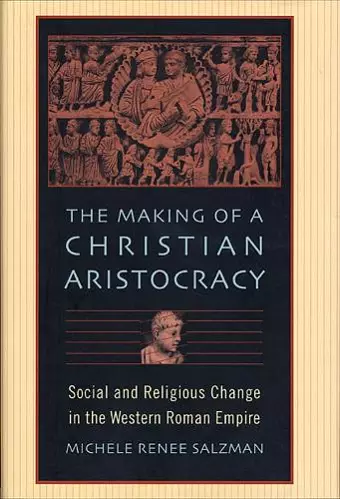The Making of a Christian Aristocracy
Social and Religious Change in the Western Roman Empire
Format:Paperback
Publisher:Harvard University Press
Published:24th Nov '04
Currently unavailable, and unfortunately no date known when it will be back

An impressive piece of work. Salzman has produced the most complete quantitative study of conversion of aristocrats to date. I particularly liked her concluding chapter on their influence on Christianity. She shows that fourth-century bishops adopted the rhetoric of "nobility" and "honor" in their preaching and writing in a way that appealed to aristocrats. -- Elizabeth Clark, Duke University An important and carefully crafted book with much that is new to say about the ways, means, and speed by which the Late Roman Empire came to convert to Christianity in the wake of Constantine's change of allegiance. Salzman constantly strives to turn numbers into real people and real lives, to set her findings as fully as possible in political, social, and cultural context. And her writing is clear and effective. -- Peter Heather, University College, London
What did it take to cause the Roman aristocracy to turn to Christianity, changing centuries-old beliefs and religious traditions? Salzman takes a fresh approach to this much-debated question by focusing on a sampling of individual aristocratic men and women as well as on writings and archeological evidence.
What did it take to cause the Roman aristocracy to turn to Christianity, changing centuries-old beliefs and religious traditions? Michele Salzman takes a fresh approach to this much-debated question. Focusing on a sampling of individual aristocratic men and women as well as on writings and archeological evidence, she brings new understanding to the process by which pagan aristocrats became Christian, and Christianity became aristocratic.
Roman aristocrats would seem to be unlikely candidates for conversion to Christianity. Pagan and civic traditions were deeply entrenched among the educated and politically well-connected. Indeed, men who held state offices often were also esteemed priests in the pagan state cults: these priesthoods were traditionally sought as a way to reinforce one’s social position. Moreover, a religion whose texts taught love for one’s neighbor and humility, with strictures on wealth and notions of equality, would not have obvious appeal for those at the top of a hierarchical society. Yet somehow in the course of the fourth and early fifth centuries Christianity and the Roman aristocracy met and merged.
Examining the world of the ruling class—its institutions and resources, its values and style of life—Salzman paints a fascinating picture, especially of aristocratic women. Her study yields new insight into the religious revolution that transformed the late Roman Empire.
This fascinating and important book…discusses the social origins and career paths of the aristocratic men—and the family involvements of the women—who converted to Christianity, and concludes by exploring ‘the emperor’s influence on aristocratic conversion’ and ‘the aristocrats’ influence on Christianity’… Salzman’s work is important not just for the study of the early church but for the study of the whole history of Christianity. The class distinctions which she so ably explores were significant not only for early Christians, but also for the medieval church and the Reformation church. -- Robert M. Grant * Christian Century *
There is much to praise here. Salzman makes a coherent and believable case, and argues it well. She provides statistical derivatives of her database in the form of tables, from which others may form further conclusions… [Salzman] has elucidated one piece of the puzzle, and provided a wealth of data and approaches for others to take outstanding questions forward. -- Malcolm Choat * Scholia Reviews *
An indispensable study of what the ‘average’ aristocrat would have experienced in coming to call upon Jesus instead of Jupiter…it accurately and articulately details the Christianization of the empire’s leading families. -- David Vincent Meconi * Journal of Early Christian Studies *
This is a fine book, genuinely paradigm-shifting and splendidly argued…remarkably firm and convincing. It offers a major addition to our knowledge of late antiquity. -- John Moorhead * Journal of Religious Studies *
An impressive piece of work. Salzman has produced the most complete quantitative study of conversion of aristocrats to date. I particularly liked her concluding chapter on their influence on Christianity. She shows that fourth-century bishops adopted the rhetoric of ‘nobility’ and ‘honor’ in their preaching and writing in a way that appealed to aristocrats. -- Elizabeth Clark, Duke University
An important and carefully crafted book with much that is new to say about the ways, means, and speed by which the Late Roman Empire came to convert to Christianity in the wake of Constantine’s change of allegiance. Salzman constantly strives to turn numbers into real people and real lives, to set her findings as fully as possible in political, social, and cultural context. And her writing is clear and effective. -- Peter Heather, University College London
- Nominated for James Henry Breasted Prize 2002
- Nominated for Award for Excellence in the Study of Religion 2002
ISBN: 9780674016033
Dimensions: 227mm x 144mm x 25mm
Weight: unknown
368 pages